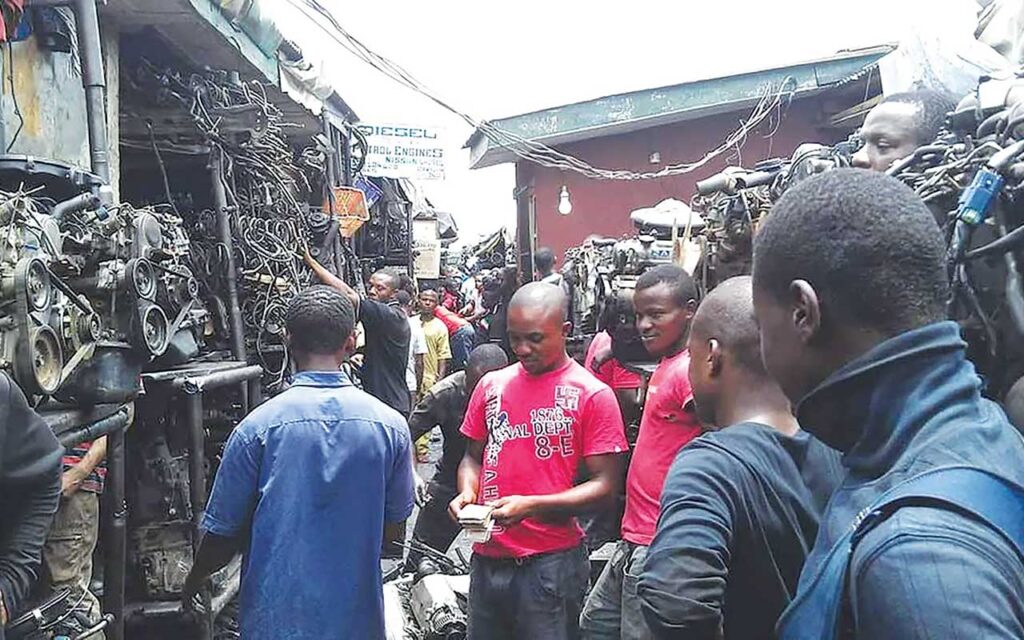
Quite impressive is the new vigour at the Nigeria Immigration Service (NIS) that has led to the issuance of 204,332 passports backlog within a two-week ultimatum. The laudable reform, led by the Minister of Interior, Dr Olubunmi Tunji-Ojo, would however be incomplete without purging the NIS of old bureaucracy, inefficiency and saboteurs, TINA ABEKU reports.
Nigeria’s challenge of not issuing international passports in record time to applicants defied all solutions proffered by the past administrations, as interventions went downhill. As a result, the minister of Interior, Dr Tunji-Ojo shortly after assuming office, promised to tackle the challenge as soon as possible.
Tunji-Ojo explained that his key target in the end is to decentralise passport application centres with an integrated feedback mechanism, reduce human interface in the process and review all third-party agreements, if necessary, downsize on service providers as well as domesticate passport production. These moves, the minister claimed, would boost efficiency and ease passport difficulties faced by applicants at home and in diaspora.
Before now, concerns have continued to grow among Nigerians over the difficulty in getting the document. These difficulties range from excess passport processing fee charges, unnecessary delays in processing the passport and outright corrupt practices.
Shortly after the declaration of the two weeks passport clearance ultimatum, the minister’s X handle was flooded with comments such as: “Two weeks, realistic expectations?”, an X user @aeonalloy inquired. Another X user @JetroOlowole wrote, “On your order to clear backlogs of applications within the next two weeks, I must commend you, but you should know that this is a tall order.” Others like @SaheeA61 wrote, “This can only be possible if you digitalise the whole process. I did the process including payment online. I also chose a date for capturing online but when I got to the office (passport office), the story changed. I was made to pay N15, 000 before capturing and N30, 000 if I want express. Now, it is over two months.”
While giving an update on the status of clearing the backlogs of passports recently, the minister said: “The issuance of passports shouldn’t be a privilege but a right of every Nigerian. Visas are a privilege, but passports are a right and we are glad to be able to hand back the right of the people to the people of Nigeria.
“When we came, we inherited a backlog of 204,332 applications. We gave a marching order and by October 1st, we had cleared all the backlogs. On September 7, we promised to sort out the backlog in two weeks. I apologise to Nigerians first of all that we couldn’t make it in two weeks, but made it in three weeks, and we are grateful for where we are today.”

It was a great start for the minister, but the recent weeks are still far from satisfactory. Despite efforts to make the process efficient, some applicants’ experiences are still laced with old corruption, inefficiency, and exploitation by officers.
An applicant, Uyai Ubong, said she had hoped that the process was sanitised after listening to assurances by the minister and decided to visit the NIS headquarters, where she had applied two months earlier to get her document, but got disappointed. According to her, nothing has changed as it is business as usual at the passport application processing centre, contrary to the government’s claims.
“I thought that my passport must be ready since they said all applications have been cleared. So, I came only to find out that they want me to start everything all over again after keeping me waiting for hours.
“How can they say they cleared all passport applications and people cannot see it? The politics in this country is too much,” she exclaimed in exasperation.
Another applicant, who spoke on condition of anonymity, told The Guardian that he had an insider, who helped him to procure his son’s passport within a day after parting with over N80,000 instead of N25,000 for a 32-page passport booklet with five years validity.
Recall that the minister had said application for passports would no longer be done by filling forms at the immigration passport centres but online, except for biometric capturing as scheduled during the online application process, but some still complain that the online application is hardly honoured by passport officers.
According to concerned applicants, the officers keep referring to such applications as ‘self-service’. Hence, one is unnecessarily delayed or frustrated to the extent that the only option left is to fill the form manually under the guidance of a passport officer.
As a result of this, some experts have called on the minister to tread with caution by ensuring that square pegs are put in square holes to avoid falling into the errors of his predecessors.
Executive Director of the Civil Society Advocacy Legislative Centre, (CISLAC), Auwal Rafsanjani, said unless government reforms are structurally done in the passport sector and across other government institutions, it would be difficult to sanitise the process.
“The passport system is being controlled by humans and authorisation is always given from higher officers. Therefore, those benefiting from the system will continue to undermine every effort at ridding the process of corruption.
“I can assure you that the top officials are also involved because they are the ones with access to the most secure information needed to control things. A junior or middle officer will not undermine the system if the senior officers are not involved because they are the ones with authorisation powers.
“Many Nigerians are suffering to get their international passports, especially the poor. This corruption is everywhere, even in our foreign embassies where many people cannot travel or renew their passports unless they bribe an immigration officer because many of the officers have imbibed this corruption as a way of life and are punishing fellow Nigerians with it,” he said.
Rafsanjani stated that Nigeria does not need cosmetic solutions or eye service, adding that if the minister is committed, he would deal with the situation structurally.
This, he said, is because the same corruption pervades all government agencies. “If you want to renew your drivers’ license, or get land papers, you must bribe the civil servants or else they may even go and hide the files.
“So, until there is a political will, the ministry of Interior alone cannot deal with it. Government at the top must clear the lacuna and show intolerance to corruption because as long as it remains cosmetic and eye service, it will be impossible to stamp out corruption in the passport process,” he stressed.
Also, a retired immigration officer, Joachim Olumba, believes that some of the major factors responsible for the prolonged delays in the issuance of passports are the poor welfare packages of immigration officers.
According to him, awfully low remuneration and poor working conditions also account for some measure of the extortion experienced in the passport offices. The same, he said, can also be said of nearly all public sector employees, particularly most government institutions.
“So, the case of NIS is not an isolated one. Painting a picture, which portrays the Service as strangely symbolic of corruption, is grossly misleading and unfair to the officers and men.
“I am certain that as soon as the root causes of the problems in passport administration are addressed, the attendant extortion and exploitation of the public will literally vanish.
“Immigration personnel are poorly remunerated. Salaries and allowances are nothing to write about. The working conditions for them are very poor. They are at the frontlines in the borders confronting desperate and deadly cross-border criminals while discharging their statutory duties of border control, patrol, surveillance and security.
“Majority of them are serving in commands and locations very far from their states of origin. They are transferred regularly without being paid their due allowances. They attend courses and are denied their training allowances. One can go on and on enumerating the unbearable deprivations and denials which immigration officers are subjected to, notwithstanding that they occupy a central place in the security architecture of the country,” pointed out.
According to Olumba, other security agencies like the Police; the Department of State Services (DSS); the National Intelligence Agency (NIA) and the Nigeria Customs Service (NCS) enjoy better remunerations and conditions of service, needless to add the armed forces.

“However, perhaps, it will serve the good purpose of buttressing my assertion to specifically mention that a Comptroller of Immigration Service, (CIS), earns less than N250,000 as salary monthly. And he would have put in between 25 and 30 years in the Service as a graduate before attaining that high rank,” he lamented.
As a confirmation, a source in the NIS, who preferred anonymity, explained that “passport processing is a lucrative business for our officers. It is an open market and anybody who brings a client gets a share of whatever extra is charged.
“You must understand that if people are desperately demanding for passports, there must be sharp practices. If there are givers, there will be takers and people will do anything to protect their source of income including subverting the system. So, you see the minister must really mean business to change the current way things are.”
Even as the Federal government continues to evolve strategies to tackle issues aimed at boosting efficiency and reforming the immigration service, a concerted effort should be made at curbing endemic corruption and addressing issues of staff welfare, as resolving those would be beneficial to Nigeria.













